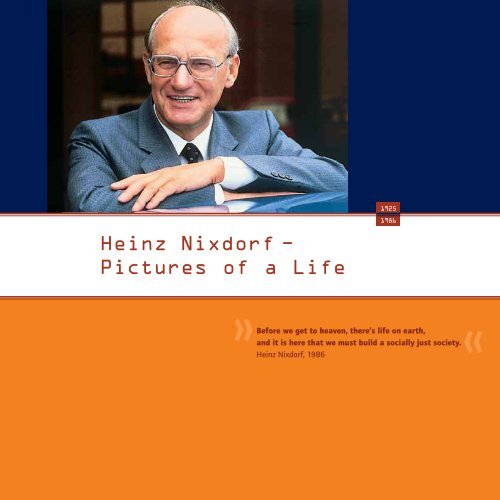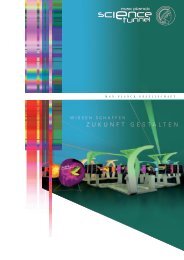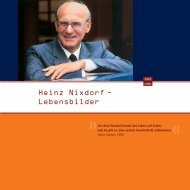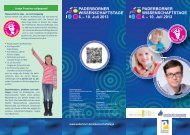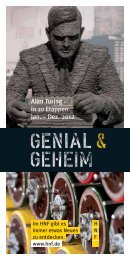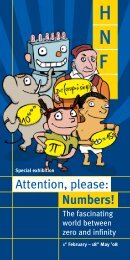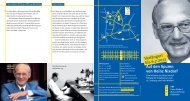Brochure "Heinz Nixdorf - Pictures of a Life" - Heinz-Nixdorf-Stiftung
Brochure "Heinz Nixdorf - Pictures of a Life" - Heinz-Nixdorf-Stiftung
Brochure "Heinz Nixdorf - Pictures of a Life" - Heinz-Nixdorf-Stiftung
You also want an ePaper? Increase the reach of your titles
YUMPU automatically turns print PDFs into web optimized ePapers that Google loves.
<strong>Heinz</strong> <strong>Nixdorf</strong> �<br />
<strong>Pictures</strong> <strong>of</strong> a Life<br />
1925<br />
1986<br />
» «<br />
Before we get to heaven, there’s life on earth,<br />
and it is here that we must build a socially just society.<br />
<strong>Heinz</strong> <strong>Nixdorf</strong>, 1986
Contents<br />
4 7<br />
8 9<br />
<strong>Heinz</strong> <strong>Nixdorf</strong> – a model social entrepreneur<br />
28 29 Brief biography and corporate history<br />
30<br />
Childhood and youth in Paderborn<br />
10 11 The entrepreneur<br />
12 13 The employer and trainer<br />
14 15 The visionary technician<br />
16 17 The builder<br />
18 19 The citizen <strong>of</strong> Paderborn and Westphalia<br />
20 21 The sportsman and sports sponsor<br />
22 23 The family man<br />
24 27 The benefactor<br />
Imprint
4<br />
<strong>Heinz</strong> <strong>Nixdorf</strong>, founder <strong>of</strong> <strong>Nixdorf</strong> Computer AG and supervisory<br />
board chairman Dr. Gerhard Schmidt, around 1975<br />
<strong>Heinz</strong> <strong>Nixdorf</strong> �<br />
a model social<br />
entrepreneur<br />
<strong>Heinz</strong> <strong>Nixdorf</strong> founded his Labor für Impulstechnik (Laboratory<br />
for Impulse Technology) in July 1952. This modest<br />
step laid the foundations for one <strong>of</strong> the most exceptional<br />
corporate developments <strong>of</strong> the post-war period<br />
in Germany – the establishment <strong>of</strong> one <strong>of</strong> the world’s<br />
biggest computer manufacturers in an industry dominated<br />
by large conglomerates.<br />
<strong>Heinz</strong> <strong>Nixdorf</strong> exemplifies the drive and innovative ability<br />
<strong>of</strong> the entrepreneurs who played a significant role in<br />
what came to be known as the German economic<br />
miracle. When he became the first entrepreneur to be<br />
awarded the prestigious Ludwig Erhard Medal in 1983<br />
for his remarkable contributions to the social market<br />
economy, Richard von Weizsäcker – then mayor <strong>of</strong><br />
Berlin and later Germany’s Federal President – described<br />
<strong>Nixdorf</strong> as “Germany’s most successful entrepreneur <strong>of</strong><br />
the post-war period”.
1984 press briefing on annual results with<br />
managing board members (from right to left)<br />
Dr. Horst Nasko, Arno Bohn, <strong>Heinz</strong> <strong>Nixdorf</strong>,<br />
Klaus Luft, Dr. Hartmut Fetzer, Karlheinz Voll,<br />
1984<br />
<strong>Heinz</strong> <strong>Nixdorf</strong> possessed all the characteristics required <strong>of</strong><br />
a dynamic entrepreneur: the willingness to take risks,<br />
self-confidence, a pioneering spirit, discipline and<br />
motivation. He regarded work as his mission in life,<br />
but also as an opportunity to play a part in the shaping<br />
<strong>of</strong> society. For him, the creation <strong>of</strong> jobs was one <strong>of</strong><br />
the most important tasks <strong>of</strong> an entrepreneur.<br />
<strong>Heinz</strong> <strong>Nixdorf</strong> had the rare gift <strong>of</strong> being able to think in<br />
simple terms. Instead <strong>of</strong> being tempted to devise complex<br />
solutions to the problems he encountered, his<br />
intuitive grasp <strong>of</strong> the essential issues and his ability<br />
to gain insights from them always led him to practiceoriented<br />
results.<br />
Pr<strong>of</strong>it as self-generated capital is the basis<br />
for job creation – and this is the most important<br />
duty for any entrepreneur.<br />
<strong>Heinz</strong> <strong>Nixdorf</strong>, annual general meeting 1985<br />
<strong>Nixdorf</strong>’s work as a computer pioneer thus paved the way<br />
for decentralised data processing all over the world. He<br />
envisioned and created computers that were intended<br />
to be easy-to-operate tools for the workplace: Even in<br />
later years, <strong>Nixdorf</strong> was able to dismantle and subsequently<br />
reassemble his company’s computers during<br />
factory tours for visitor groups from Japan or the USA,<br />
for example – an accomplishment that never failed to<br />
astonish those watching!<br />
Although he held patents <strong>of</strong> his own, <strong>Heinz</strong> <strong>Nixdorf</strong> was<br />
not a typical inventor. He was the entrepreneurial<br />
designer <strong>of</strong> practical technical solutions, manufacturing<br />
methods, distribution processes, factory buildings and<br />
5
6<br />
Presentation <strong>of</strong> the Ludwig Erhard Medal to <strong>Heinz</strong> <strong>Nixdorf</strong> by<br />
the Governing Mayor <strong>of</strong> Berlin, Richard von Weizsäcker, 1983<br />
administrative premises. He was also exceptionally competent<br />
with corporate finances, and could grasp the key<br />
figures in the balance sheets <strong>of</strong> foreign subsidiaries or<br />
business partners, whether in Tokyo or New York, more<br />
quickly than many experts. He was both a visionary<br />
technician and a businessman in what proved to be a<br />
rare successful combination <strong>of</strong> the two.<br />
On a personal level, <strong>Heinz</strong> <strong>Nixdorf</strong> was a modest and disciplined<br />
individual who was both down-to-earth and<br />
cosmopolitan in outlook. He was not fond <strong>of</strong> personal<br />
publicity and tended to be rather outspoken – which did<br />
not always go down well with his listeners. His overriding<br />
interest was the welfare <strong>of</strong> his fellow human beings;<br />
<strong>Heinz</strong> <strong>Nixdorf</strong> and his wife Renate at a reception<br />
held in Bonn to mark the visit <strong>of</strong> US President<br />
Ronald Reagan, 1985<br />
he was a social individual in the best sense <strong>of</strong> the word.<br />
He established social institutions and benefits for his<br />
employees that were far more generous than was common<br />
at the time.<br />
<strong>Nixdorf</strong> wanted his company to remain independent; it<br />
should certainly not be subject to control from third<br />
parties. Thus the two non-pr<strong>of</strong>it foundations, the <strong>Heinz</strong><br />
<strong>Nixdorf</strong> <strong>Stiftung</strong> and <strong>Stiftung</strong> Westfalen, were established<br />
to hold shares in <strong>Nixdorf</strong> Computer AG. After the<br />
takeover <strong>of</strong> <strong>Nixdorf</strong> Computer by Siemens AG in 1990,<br />
these foundations went on pursuing their varied nonpr<strong>of</strong>it-making<br />
goals completely independently, as <strong>Heinz</strong><br />
<strong>Nixdorf</strong> would have wished.
Floating <strong>of</strong> <strong>Nixdorf</strong> shares on<br />
the Frankfurt stock exchange,<br />
1984<br />
The image <strong>of</strong> <strong>Heinz</strong> <strong>Nixdorf</strong> as a model social entrepreneur<br />
continues to live on, both in the memories <strong>of</strong> those<br />
closest to him in his entrepreneurial ventures, and in<br />
economic history. His memory is also visibly kept alive<br />
by the <strong>Heinz</strong> <strong>Nixdorf</strong> MuseumsForum in Paderborn,<br />
the world’s biggest computer museum. In addition to<br />
its permanent collection and its thematic exhibits, the<br />
lectures, symposia and workshops on present-day<br />
issues that are staged in the museum’s forum section<br />
are intended to help support people in meeting<br />
the demands <strong>of</strong> the knowledge and information<br />
society.<br />
<strong>Heinz</strong> <strong>Nixdorf</strong> was an entrepreneur with a keen sense<br />
<strong>of</strong> social responsibility.<br />
Helmut Kohl, 1996<br />
Our thanks go out to the authors <strong>of</strong> this brochure, Mr. Norbert<br />
Ryska, Managing Director, and Ms. Margret Schwarte-<br />
Amedick, Curator at the <strong>Heinz</strong> <strong>Nixdorf</strong> MuseumsForum.<br />
Dr. Gerhard Schmidt<br />
Chairman <strong>of</strong> <strong>Heinz</strong> <strong>Nixdorf</strong> <strong>Stiftung</strong> and <strong>Stiftung</strong> Westfalen<br />
7
8<br />
<strong>Heinz</strong> <strong>Nixdorf</strong> as a pupil at<br />
Herz Jesu elementary school, 1931<br />
Childhood<br />
and youth<br />
in Paderborn<br />
<strong>Heinz</strong> <strong>Nixdorf</strong> was born in the Westphalian city <strong>of</strong> Paderborn<br />
on 9th April 1925. Just a few weeks after his birth,<br />
the family moved to the home town <strong>of</strong> his father, a<br />
travelling salesman, and thus <strong>Nixdorf</strong> spent the first six<br />
years <strong>of</strong> his life in Torgau, Saxony. In 1931, the family<br />
returned to Paderborn, where <strong>Heinz</strong> <strong>Nixdorf</strong> started his<br />
schooling at the local Catholic primary school.<br />
<strong>Heinz</strong> <strong>Nixdorf</strong> in 1937<br />
It was definitely as a consequence <strong>of</strong> unemployment that my father<br />
was prevented from sending his son to secondary school. Thus I myself<br />
experienced the difficulties that unemployment can cause.<br />
<strong>Heinz</strong> <strong>Nixdorf</strong>, 1986<br />
<strong>Heinz</strong> <strong>Nixdorf</strong> enjoyed his schooldays. He achieved good<br />
marks, and his teachers acknowledged his “gratifying<br />
intellectual aspirations”. However, the family could not<br />
afford to send him to a secondary school to prepare<br />
for university; <strong>Nixdorf</strong> counted himself fortunate to<br />
receive a scholarship to a teacher training establishment<br />
in Vallendar/Rhein when his primary education<br />
was over. In 1942 he was called up for military<br />
service. It was only after the end <strong>of</strong> the war, in 1946,<br />
that he was able to catch up with the schooling he<br />
had missed and complete his “Abitur” (university<br />
entrance examinations) at Paderborn’s Reismann<br />
Gymnasium.
<strong>Heinz</strong> <strong>Nixdorf</strong>’s childhood and youth were spent in impoverished<br />
circumstances. Although his father was initially well<br />
able to provide for his fast-growing family, the <strong>Nixdorf</strong>s<br />
could not escape the repercussions <strong>of</strong> the global depression,<br />
and <strong>Heinz</strong> <strong>Nixdorf</strong>’s father lost his job in 1931. He later<br />
found a new position as an assistant supervisor <strong>of</strong> operations<br />
on the state railway in Paderborn, but the family was<br />
once again plunged into economic uncertainty when he<br />
was killed during the war in 1944. As the eldest son, <strong>Heinz</strong><br />
<strong>Nixdorf</strong> had to help support his mother and siblings through<br />
seasonal work. These childhood experiences left their mark<br />
on him and became one <strong>of</strong> the greatest driving forces behind<br />
his determination to create new jobs in his company.<br />
<strong>Heinz</strong> <strong>Nixdorf</strong> during his<br />
university days with his fellow<br />
students in 1950<br />
In 1947, <strong>Heinz</strong> <strong>Nixdorf</strong> enrolled on a degree course in<br />
physics and business studies at the University <strong>of</strong> Frankfurt/Main.<br />
But his life story took another unforeseen<br />
turn in 1951 when, as a student trainee in his ninth<br />
semester, he met the physicist Dr. Walter Sprick at<br />
Remington Rand. It was from this man that <strong>Heinz</strong><br />
<strong>Nixdorf</strong> acquired his basic knowledge <strong>of</strong> electronic<br />
computer construction. Just seven months later, he<br />
took the decision to abandon his studies, founding a<br />
company known as “Labor für Impulstechnik” (Laboratory<br />
for Impulse Technology), which rose from modest<br />
beginnings to become a worldwide player in the computer<br />
business.<br />
9
10<br />
Registration in Paderborn’s commercial<br />
register, 1958<br />
The<br />
entrepreneur<br />
<strong>Heinz</strong> <strong>Nixdorf</strong> with his early products<br />
at the Hanover Fair, 1956<br />
<strong>Heinz</strong> <strong>Nixdorf</strong> was the founder and long-standing Chairman<br />
<strong>of</strong> the Board <strong>of</strong> <strong>Nixdorf</strong> Computer AG. He managed this<br />
high-tech company, which he guided from extremely<br />
modest beginnings to become one <strong>of</strong> the world’s leading<br />
corporate groups, up until his untimely death in<br />
1986. With subsidiaries in 44 countries and 25,500<br />
employees around the globe, the company achieved<br />
sales <strong>of</strong> DM 4.5 billion in 1986. Production facilities<br />
were located at seven German sites as well as in Ireland,<br />
Spain, the USA and Singapore.<br />
In a pioneering manoeuvre in the German computer industry,<br />
<strong>Heinz</strong> <strong>Nixdorf</strong> seized the historically opportune<br />
moment to use the new technologies <strong>of</strong> his day in the
Shipping department <strong>of</strong> <strong>Nixdorf</strong><br />
Computer AG, around 1980<br />
This is the way I understand the responsibility <strong>of</strong> entrepreneurs: to introduce<br />
large numbers <strong>of</strong> people to work, success and a monthly wage.<br />
<strong>Heinz</strong> <strong>Nixdorf</strong>, 1984<br />
service <strong>of</strong> <strong>of</strong>fice communication. Unburdened by the<br />
tradition <strong>of</strong> established <strong>of</strong>fice machine manufacturers,<br />
in 1952 <strong>Nixdorf</strong> ventured into the emerging field <strong>of</strong><br />
electronics. He was among the first to anticipate the<br />
enormous market potential for small and medium-sized<br />
computers – <strong>of</strong>fice systems that then operated “below<br />
the radar” <strong>of</strong> the all-dominating mainframe computer<br />
systems. By the mid 1960s, <strong>Nixdorf</strong> was developing<br />
computers for the commercial and administrative sector<br />
with a price/performance ratio which proved extremely<br />
attractive to small and medium-sized businesses. In<br />
addition to hardware, and in keeping with his user-oriented<br />
objectives, <strong>Nixdorf</strong> provided a comprehensive<br />
Electronics production at the Singapore facility,<br />
around 1983<br />
range <strong>of</strong> application s<strong>of</strong>tware tailored to his users’<br />
demands, plus data processing training courses and<br />
other related services.<br />
This all-in service concept enabled the company to gain a<br />
competitive edge and achieve considerable commercial<br />
success. <strong>Nixdorf</strong> Computer AG was able to maintain this<br />
advantage in the 1970s with network-compatible multiuser<br />
systems installed predominantly in the financial<br />
and commercial sectors, but also in the automotive<br />
industry. By the mid 1980s, the company had grown to<br />
become Europe’s fourth largest computer manufacturer.<br />
11
12<br />
<strong>Heinz</strong> <strong>Nixdorf</strong> and employees in the<br />
electronics production facility, 1984<br />
The widespread application <strong>of</strong> computers makes a factory more humane.<br />
<strong>Heinz</strong> <strong>Nixdorf</strong>, 1984<br />
The employer<br />
and trainer<br />
As an employer, <strong>Heinz</strong> <strong>Nixdorf</strong> was first and foremost an<br />
exceptional motivator who was able to inspire his workforce.<br />
He was a credible figure because he was <strong>of</strong>ten<br />
on site, spoke the language <strong>of</strong> his staff, had the same<br />
<strong>of</strong>fice furnishings as they did and tolerated few hierarchies<br />
and privileges.<br />
But <strong>Heinz</strong> <strong>Nixdorf</strong> was not an easy-going boss. He required<br />
the same motivation and discipline from each <strong>of</strong> his<br />
employees as he demonstrated himself. He had very<br />
Business training,<br />
1984<br />
precise perceptions <strong>of</strong> orderliness, and also demanded<br />
strict punctuality and scrupulous honesty. Employees who<br />
enjoyed his trust were granted great freedom <strong>of</strong> action<br />
and personal responsibility. He particularly admired the<br />
foremen and skilled workers in his production facilities<br />
for their expertise, great commitment and all-embracing<br />
sense <strong>of</strong> responsibility; and he relied on and promoted<br />
young people.<br />
<strong>Heinz</strong> <strong>Nixdorf</strong> was ever aware <strong>of</strong> the entrepreneur’s social<br />
responsibility to create as many jobs as possible and to<br />
provide young people with training. Thus he placed great<br />
emphasis on training people in his own company. His first<br />
trainee began an apprenticeship in electromechanics in
Trainees’ sports festival at the Ahorn Sports Park, 1987<br />
The constitutions <strong>of</strong> some <strong>of</strong> our young people are quite shocking. Sometimes<br />
a trainee can really only manage 3.08 m in the long jump. That is why I demand<br />
that all our trainees first <strong>of</strong> all make an effort to become fit, for example by<br />
means <strong>of</strong> 5 km endurance runs. <strong>Heinz</strong> <strong>Nixdorf</strong>, 1985<br />
1960. At first, 4 apprentices were taken on annually,<br />
increasing to 52 in 1966. And from 1967 onwards, his<br />
company also <strong>of</strong>fered training in business as well as in<br />
the technical pr<strong>of</strong>essions. Since the theoretical instruction<br />
provided by vocational schools was not keeping pace<br />
with the requirements <strong>of</strong> the new data processing pr<strong>of</strong>essions,<br />
<strong>Nixdorf</strong> Computer AG provided additional in-house<br />
instruction, and <strong>Heinz</strong> <strong>Nixdorf</strong> received state approval for<br />
his own vocational school in 1970. Over the years, <strong>Nixdorf</strong><br />
continually increased his commitment to training, preparing<br />
ever more young people for a variety <strong>of</strong> pr<strong>of</strong>essions.<br />
By the 1980s, 9% <strong>of</strong> his employees in Germany were<br />
trainees – the highest rate <strong>of</strong> any large German company.<br />
It was at <strong>Heinz</strong> <strong>Nixdorf</strong>’s initiative that the non-pr<strong>of</strong>it training<br />
association Bildungszentrum für informationsverarbeitende<br />
Berufe (b.i.b.) was founded in Paderborn in 1972. He wanted<br />
to train young people as computer experts capable <strong>of</strong><br />
developing the tools <strong>of</strong> the digital age in a way that was<br />
both humanly and technically appropriate, and suitable<br />
for industrial use. This educational mandate <strong>of</strong> its founder<br />
continues to be satisfied by both b.i.b. and the technical<br />
college Fachhochschule der Wirtschaft (FHDW), which was<br />
created under it. These two institutions have trained over<br />
20,000 skilled IT experts at sites in Paderborn, Bielefeld,<br />
Bergisch Gladbach, Dresden, Görlitz, Gütersloh and<br />
Hanover.<br />
13
14<br />
<strong>Heinz</strong> <strong>Nixdorf</strong> at his desk at the Rheinisch-<br />
Westfälisches Elektrizitätswerk, Essen, 1954<br />
The visionary<br />
technician<br />
Konrad Zuse with <strong>Heinz</strong> <strong>Nixdorf</strong> during<br />
a visit to the Paderborn plant, 1984<br />
<strong>Heinz</strong> <strong>Nixdorf</strong> was one <strong>of</strong> the greatest pioneers <strong>of</strong> German<br />
computer technology. He was initially an inventor and<br />
constructor, as documented by various patents. Even<br />
as an entrepreneur, he remained a technician to the<br />
extent that he was able to formulate clear-cut technical<br />
objectives and ask the right critical questions <strong>of</strong> his<br />
developers. For <strong>Heinz</strong> <strong>Nixdorf</strong>, technology was never<br />
an end in itself. Instead, it was there to serve the<br />
needs <strong>of</strong> both the customers and the market. His<br />
development <strong>of</strong> the smaller “820” computer marked<br />
the beginning <strong>of</strong> the shift from centralised to decentralised<br />
data processing. His guiding principle <strong>of</strong><br />
bringing computers to the workplace enabled small
Prototype <strong>of</strong> the electron adding machine, 1954 The patent certificate shows <strong>Heinz</strong> <strong>Nixdorf</strong><br />
to be the owner, 1965<br />
We are not in the business <strong>of</strong> providing machines to destroy<br />
the old world, but <strong>of</strong> supplying elements to build a new one.<br />
<strong>Heinz</strong> <strong>Nixdorf</strong>, 1979<br />
and medium-sized businesses to process their financial,<br />
accounting and inventory data electronically for the first<br />
time. This system philosophy remained the recipe for<br />
success <strong>of</strong> <strong>Nixdorf</strong>’s company.<br />
The technical hallmarks <strong>of</strong> all <strong>Nixdorf</strong> products were their<br />
great networking capability, industry-specific system and<br />
application s<strong>of</strong>tware and their ergonomically sophisticated<br />
design. <strong>Heinz</strong> <strong>Nixdorf</strong> was extremely quality-conscious<br />
and rejected any solution he regarded as “quick<br />
and dirty”. For example, he dismissed the development<br />
<strong>of</strong> the PC as an invention that had no future, saying<br />
“Wir bauen keine Mopeds!” (“We don’t build mopeds<br />
here!”)<br />
<strong>Heinz</strong> <strong>Nixdorf</strong> was fascinated by technical innovations in<br />
other fields too. Not only did he drive on principle an<br />
NSU RO 80 with its Wankel engine, but he also collaborated<br />
with Felix Wankel and the inventor <strong>of</strong> the<br />
eco-engine on the development <strong>of</strong> a diesel-driven aircraft<br />
engine. He had the first sailing computer built<br />
with a view to optimising the trimming <strong>of</strong> racing<br />
yachts, and during the final months <strong>of</strong> his life he even<br />
collaborated with his developers in constructing a<br />
bicycle for the older generation: on the level stretches,<br />
the pedalling rider could charge the battery to generate<br />
the energy required to power the bicycle up the<br />
inclines.<br />
15
16<br />
<strong>Heinz</strong> <strong>Nixdorf</strong> inspects the building site where<br />
work is in progress to construct his first plant<br />
on Pontanusstrasse in Paderborn, 1963<br />
The<br />
builder<br />
The Governing Mayor <strong>of</strong> Berlin, Eberhard<br />
Diepgen, lays the foundation stone for the<br />
Berlin plant, 1984<br />
With his lively interest in architecture, <strong>Heinz</strong> <strong>Nixdorf</strong> played<br />
a pivotal role in designing the company’s own premises.<br />
Taking the architect Mies van der Rohe as a stylistic role<br />
model, he and his architects developed and optimised<br />
a design in modular dimensions (1.80 m x 1.80 m) and<br />
set down construction standards. Here, too, he followed<br />
his principle <strong>of</strong> making complex things simple. This<br />
approach resulted in a number <strong>of</strong> flexible-purpose<br />
corporate buildings <strong>of</strong> uniformly distinctive appearance<br />
all over the globe.
The Munich <strong>of</strong>fice, 1985 Extension <strong>of</strong> the head <strong>of</strong>fice on the Fürstenallee, 1985<br />
Technological change is not achieved by revolution,<br />
but by evolution, by an infinite number <strong>of</strong> small steps,<br />
taken unceasingly.<br />
<strong>Heinz</strong> <strong>Nixdorf</strong>, 1986<br />
His quest for independence and self-determination prompted<br />
<strong>Heinz</strong> <strong>Nixdorf</strong> to have all the building work performed<br />
by the company’s own construction service,<br />
which built up to 25,000 m 2 <strong>of</strong> floorspace every year.<br />
And it goes without saying that <strong>Heinz</strong> <strong>Nixdorf</strong> always<br />
personally monitored the progress <strong>of</strong> his various construction<br />
projects! The premises on the “Fürstenallee”<br />
avenue in Paderborn, where the head <strong>of</strong>fice <strong>of</strong> <strong>Nixdorf</strong><br />
Computer AG was located, are now occupied in a<br />
unique trinity by the <strong>Heinz</strong> <strong>Nixdorf</strong> Institute, the <strong>Heinz</strong><br />
<strong>Nixdorf</strong> MuseumsForum and the Bildungszentrum für<br />
informationsverarbeitende Berufe (b.i.b.) in conjunction<br />
with the technical college Fachhochschule der<br />
Wirtschaft.<br />
17
18<br />
Paderborn’s town hall during the “Libori” festival, 2002<br />
The citizen<br />
<strong>of</strong> Paderborn<br />
and Westphalia<br />
It was not just <strong>Heinz</strong> <strong>Nixdorf</strong>’s Westphalian dialect that<br />
<strong>of</strong>fered the listener clues as to his roots. He also possessed<br />
the typical “Westphalian” virtues <strong>of</strong> a pronounced<br />
sense <strong>of</strong> order, an intelligent form <strong>of</strong> obstinacy in accomplishing<br />
his objectives, and honesty in his dealings with<br />
employees and business customers alike. <strong>Heinz</strong> <strong>Nixdorf</strong><br />
was particularly attached to his native region. He was<br />
proud <strong>of</strong> the history <strong>of</strong> his home town <strong>of</strong> Paderborn<br />
and was always delighted to have the opportunity <strong>of</strong><br />
showing visitors round the historic city in person.
<strong>Heinz</strong> <strong>Nixdorf</strong> with members <strong>of</strong> the Paderborn<br />
“Schützenverein” club, around 1985<br />
Work was not the only thing he wanted to give to the<br />
inhabitants <strong>of</strong> “his” Westphalia. <strong>Heinz</strong> <strong>Nixdorf</strong> also<br />
wanted them to enjoy a special quality <strong>of</strong> life, and he<br />
promoted this aim via numerous endowments in social,<br />
sporting and cultural areas alike. His many initiatives<br />
included proposals to build and subsequently extend<br />
Paderborn-Lippstadt Airport, to provide an autobahn<br />
link for the city <strong>of</strong> Paderborn (the A33) and to create<br />
the recreational meadow round the Padersee lake now<br />
known as the “<strong>Heinz</strong> <strong>Nixdorf</strong> Aue”.<br />
Paderborn-Lippstadt Airport, 2002<br />
…I’m a Westphalian, not a North Rhine-Westphalian.<br />
I can’t be both at once.<br />
<strong>Heinz</strong> <strong>Nixdorf</strong>, 1985<br />
At the same time, he lobbied the state government in<br />
Düsseldorf ceaselessly and vehemently for the greater<br />
promotion <strong>of</strong> trade and industry in eastern Westphalia.<br />
It is not for nothing that one <strong>of</strong> his foundations pointedly<br />
bears the name “<strong>Stiftung</strong> Westfalen.”<br />
19
20<br />
<strong>Heinz</strong> <strong>Nixdorf</strong> with Josef Pieper at the helm<br />
at a sailing regatta, around 1984<br />
The sportsman<br />
and<br />
sports sponsor<br />
From his boyhood onwards, <strong>Heinz</strong> <strong>Nixdorf</strong> was fascinated<br />
by sporting achievements – particularly in the area <strong>of</strong><br />
track and field. Thus, even as an entrepreneur with<br />
a busy schedule, he always found time for sporting<br />
Even if I’ve lost, I still want to be up there alongside the top competitors.<br />
<strong>Heinz</strong> <strong>Nixdorf</strong>, 1984<br />
activities. He began sailing at the age <strong>of</strong> 45. Here, too,<br />
the motivation to become the best never left him, and<br />
what had started out as a recreational hobby became<br />
a highly competitive venture. With his driver, Josef<br />
Pieper, at the helm, he participated in major domestic<br />
and international regattas in the star class. In 1974 –<br />
just four years after obtaining his sailing licence – he<br />
claimed a stage victory in the world championships<br />
in Spain and 8th place in the overall standings. And<br />
in 1980, he once again sailed “close to the wind”,<br />
coming fifth in the North American championships.<br />
Not only did <strong>Heinz</strong> <strong>Nixdorf</strong> demand pr<strong>of</strong>essional and<br />
sporting achievements from himself, he also wanted
Trainees undergo sports training with Kurt Bendlin, former worldrecord-holder<br />
in the decathlon, at the Ahorn Sports Park, 1985<br />
to motivate both his employees and the citizens <strong>of</strong><br />
Paderborn in general to participate more in sporting<br />
activities. To this end, he demonstrated great personal<br />
and financial commitment to popular sport in the<br />
region. His sponsorship efforts in Paderborn were<br />
focused on amateur sports for the general public,<br />
with particular subsidies for hands-on work at sport<br />
clubs and the improvement <strong>of</strong> the general local sports<br />
infrastructure. It was in this context that he had the<br />
Ahorn Sports Park built on the company premises at<br />
<strong>Heinz</strong>-<strong>Nixdorf</strong>-Ring in 1983/1984. This facility comprised<br />
a 10,000 m 2 stadium, an indoor sports hall and<br />
multi-functional leisure facilities as well as outdoor<br />
Club sports at the Ahorn<br />
Sports Park, around 1985<br />
areas for discus-throwing, shot-putting and stoneputting,<br />
track racing and lawns used as small playing<br />
fields.<br />
<strong>Heinz</strong> <strong>Nixdorf</strong> also insisted that his trainees keep themselves<br />
fit. In order to encourage them to do so, he<br />
released them from two hours <strong>of</strong> their working week in<br />
order to play sports. In 1979, he even engaged a former<br />
world-record-holder in the decathlon, Kurt Bendlin, as<br />
the head <strong>of</strong> sports at <strong>Nixdorf</strong> Computer AG. The initiative<br />
to establish an Institute for Sports Medicine at<br />
the University <strong>of</strong> Paderborn can also be traced back to<br />
<strong>Heinz</strong> <strong>Nixdorf</strong>, who sponsored this project with a generously<br />
endowed chair.<br />
21
22<br />
Three generations <strong>of</strong> the <strong>Nixdorf</strong> family, 1983 <strong>Heinz</strong> <strong>Nixdorf</strong> with his wife Renate at the toppingout<br />
ceremony for the Ahorn Sports Park, 1983<br />
The<br />
family man<br />
Politics must create the framework to ensure that work is worthwhile<br />
and that having children is a joy instead <strong>of</strong> a burden.<br />
<strong>Heinz</strong> <strong>Nixdorf</strong>, 1985<br />
<strong>Heinz</strong> <strong>Nixdorf</strong> always took great care to protect his private<br />
and family life – as little time as he had for it – from<br />
the media and the eyes <strong>of</strong> the public.<br />
In 1958, he met his future wife, Renate Ring, on a visit to<br />
Harpener Bergbau AG in Dortmund. She was working
Renate <strong>Nixdorf</strong> and her sons at the opening <strong>of</strong> the<br />
<strong>Heinz</strong> <strong>Nixdorf</strong> MuseumsForum in Paderborn, 1996<br />
as a data typist in the company’s punched-card department,<br />
using the electron multiplier constructed by<br />
<strong>Nixdorf</strong>. The couple married in Paderborn in 1960,<br />
and the three sons from the marriage, Martin, Michael<br />
and Matthias, now all work in various fields <strong>of</strong> business.<br />
Since the death <strong>of</strong> her husband, Renate <strong>Nixdorf</strong> has<br />
supported the region <strong>of</strong> Paderborn in a wide variety<br />
<strong>of</strong> ways. This commitment earned her the Cross <strong>of</strong> the<br />
Order <strong>of</strong> Merit <strong>of</strong> the Federal Republic <strong>of</strong> Germany in<br />
December 2001.<br />
23
24<br />
Board <strong>of</strong> managing directors <strong>of</strong> the <strong>Heinz</strong> <strong>Nixdorf</strong> <strong>Stiftung</strong> and<br />
<strong>Stiftung</strong> Westfalen (from left to right) Dr. Horst Nasko, Dr. Gerhard<br />
Schmidt, Martin <strong>Nixdorf</strong>, 2004<br />
The<br />
benefactor<br />
Founding <strong>of</strong> an endowed chair in sports<br />
medicine at the University <strong>of</strong> Paderborn, 1986<br />
Shortly before his death in 1986, <strong>Heinz</strong> <strong>Nixdorf</strong> established<br />
two non-pr<strong>of</strong>it foundations, the <strong>Heinz</strong> <strong>Nixdorf</strong> <strong>Stiftung</strong><br />
and <strong>Stiftung</strong> Westfalen. The trust funds for these foundations<br />
– which originally consisted <strong>of</strong> shares in <strong>Nixdorf</strong><br />
Computer AG – have come from the estate <strong>of</strong> the entrepreneur.
Scholarship holders from the Asia-Pacific programme<br />
<strong>of</strong> the <strong>Heinz</strong> <strong>Nixdorf</strong> <strong>Stiftung</strong>, 2002<br />
The purpose <strong>of</strong> these foundations is the promotion <strong>of</strong><br />
a) research and teaching in the field <strong>of</strong> science, with the<br />
emphasis on information technology,<br />
b) further education and training, as well as education in<br />
general,<br />
c) the liberal democratic state, especially the social market<br />
economy, and<br />
d) the health <strong>of</strong> the population, including sport.<br />
The <strong>Stiftung</strong> Westfalen operates in the region <strong>of</strong> Westphalia,<br />
while the <strong>Heinz</strong> <strong>Nixdorf</strong> <strong>Stiftung</strong> is active beyond<br />
regional borders. The following not-for-pr<strong>of</strong>it institu-<br />
Interior view <strong>of</strong> the <strong>Heinz</strong> <strong>Nixdorf</strong> Institute in<br />
Paderborn, 2002<br />
tions, which are supported and sponsored by these<br />
two foundations, have their roots in the ideas and<br />
works <strong>of</strong> their benefactor <strong>Heinz</strong> <strong>Nixdorf</strong>:<br />
The <strong>Heinz</strong> <strong>Nixdorf</strong> Institute<br />
Even early in his career, <strong>Heinz</strong> <strong>Nixdorf</strong> was keen to forge<br />
closer links between university research and industrial<br />
development in order to successfully meet the technical<br />
challenges <strong>of</strong> the early information age. A year<br />
after <strong>Heinz</strong> <strong>Nixdorf</strong>’s death, an agreement concluded<br />
in 1987 between the <strong>Stiftung</strong> Westfalen, the State<br />
<strong>of</strong> North Rhine Westphalia and the Federation paved<br />
the way for one <strong>of</strong> Germany’s biggest independent<br />
25
26<br />
Foyer <strong>of</strong> the <strong>Heinz</strong> <strong>Nixdorf</strong> MuseumsForum<br />
in Paderborn, 1996<br />
research establishments for computer science. Thus it<br />
was that the <strong>Heinz</strong> <strong>Nixdorf</strong> Institute (HNI) – an interdisciplinary<br />
research centre for computer science and technology<br />
at the University <strong>of</strong> Paderborn – came into<br />
being. A particular feature <strong>of</strong> the HNI is the close collaboration<br />
between computer, natural, engineering and<br />
economic sciences.<br />
<strong>Heinz</strong> <strong>Nixdorf</strong> MuseumsForum<br />
The <strong>Stiftung</strong> Westfalen fulfilled a dream <strong>of</strong> <strong>Heinz</strong> <strong>Nixdorf</strong>’s<br />
with the establishment <strong>of</strong> the <strong>Heinz</strong> <strong>Nixdorf</strong> Museums-<br />
Forum (HNF) in Paderborn by the foundation’s subsidiary,<br />
<strong>Heinz</strong> <strong>Nixdorf</strong> MuseumsForum GmbH. This<br />
Exterior view <strong>of</strong> the <strong>Heinz</strong> <strong>Nixdorf</strong> MuseumsForum<br />
unique museum is dedicated to the historical development,<br />
present-day significance and future perspectives<br />
<strong>of</strong> information and communication technology.<br />
Opened in 1996, the HNF not only possesses a permanent<br />
exhibition, but also an events centre in which<br />
lectures, training courses and debates are held and<br />
special exhibitions are staged on important issues<br />
<strong>of</strong> the day. It is the world’s biggest computer museum<br />
as well as a lively forum for discussion on the impact<br />
<strong>of</strong> information technology on people and society<br />
alike.
28<br />
<strong>Heinz</strong> <strong>Nixdorf</strong><br />
and his company �<br />
- an overview<br />
1925 9th April: <strong>Heinz</strong> <strong>Nixdorf</strong> is born in Paderborn<br />
as the eldest <strong>of</strong> five children.<br />
1939-1942 Studies at the teacher training establishment<br />
in Vallendar/Rhein.<br />
1942-1945 Military service.<br />
1947 “Abitur” at the Reismann Gymnasium<br />
in Paderborn.<br />
1947-1952 Degree course in physics and business studies<br />
at the University <strong>of</strong> Frankfurt/Main.<br />
1951 <strong>Heinz</strong> <strong>Nixdorf</strong> is employed as a student<br />
trainee at Remington Rand in Frankfurt.<br />
Here he becomes acquainted with the development<br />
<strong>of</strong> digital switching circuits for multiplication<br />
and adding tasks.<br />
1952 Founding <strong>of</strong> the Labor für Impulstechnik (LfI) in<br />
Essen; development <strong>of</strong> the first electronic computer<br />
using vacuum tubes for Rheinisch-Westfälisches<br />
Elektrizitätswerk (RWE).<br />
1959 <strong>Nixdorf</strong> opens a second production facility in<br />
Paderborn. The LfI employs 40 staff, and the<br />
company’s head <strong>of</strong>fice is moved from Essen to<br />
Paderborn.<br />
1960 Marriage to Renate Ring; subsequent birth <strong>of</strong> sons<br />
Martin, Michael and Matthias.<br />
1961 Construction <strong>of</strong> <strong>Nixdorf</strong>’s first company-owned<br />
factory premises on Pontanusstrasse in Paderborn.<br />
1968 Acquisition <strong>of</strong> <strong>of</strong>fice machine manufacturer<br />
Wanderer Werke in Cologne, and change <strong>of</strong> name<br />
to <strong>Nixdorf</strong> Computer AG.
1974 Construction <strong>of</strong> the new production facility in<br />
Paderborn on what is now <strong>Heinz</strong>-<strong>Nixdorf</strong>-Ring.<br />
1977 Sales exceed DM 1 billion. Over 10,000 staff are<br />
employed around the globe. The company is<br />
awarded the German Marketing Prize.<br />
1983 <strong>Heinz</strong> <strong>Nixdorf</strong> becomes the first entrepreneur to<br />
be awarded the Ludwig Erhard Medal.<br />
1984 First public listing <strong>of</strong> <strong>Nixdorf</strong> shares on the German<br />
stock exchange.<br />
1985 Production capacities are extended at the factories<br />
in Germany, the USA, Ireland, Spain and Singapore.<br />
Sales reach almost DM 4 billion, and have thus<br />
risen on average by 21% per annum since 1968.<br />
The company employs 23,300 staff in 44 countries.<br />
1986 17th March: death <strong>of</strong> the company founder and<br />
Chairman <strong>of</strong> the Board <strong>of</strong> Managing Directors,<br />
<strong>Heinz</strong> <strong>Nixdorf</strong>.<br />
1990 Siemens AG takes over the majority <strong>of</strong> ordinary<br />
shares in <strong>Nixdorf</strong> Computer AG. On 1st October<br />
1990, the company is merged with the computer<br />
division <strong>of</strong> Siemens to become Siemens <strong>Nixdorf</strong><br />
Informationssysteme AG (SNI).<br />
1992 Siemens AG increases its share in SNI to 100%<br />
and incorporates it into Siemens AG.<br />
29
30<br />
Imprint<br />
Publisher<br />
Editors<br />
Layout<br />
Photos<br />
Printer<br />
Translation<br />
Copyright<br />
Source<br />
<strong>of</strong> copies<br />
<strong>Heinz</strong> <strong>Nixdorf</strong> <strong>Stiftung</strong>, Munich<br />
Norbert Ryska, Managing Director<br />
Margret Schwarte-Amedick, Curator<br />
<strong>Heinz</strong> <strong>Nixdorf</strong> MuseumsForum, Paderborn<br />
typ[e]isch Frauke Walter, Bünde<br />
HNF <strong>Heinz</strong> <strong>Nixdorf</strong> MuseumsForum GmbH/<br />
Jan Braun Photodesign, Paderborn<br />
Merkur Druck, Detmold<br />
LS Language Services, Paderborn<br />
<strong>Heinz</strong> <strong>Nixdorf</strong> <strong>Stiftung</strong>, 2006<br />
HNF <strong>Heinz</strong> <strong>Nixdorf</strong> MuseumsForum<br />
Fürstenallee 7<br />
33102 Paderborn
Paderborn production facility <strong>of</strong><br />
<strong>Nixdorf</strong> Computer AG, 1988
<strong>Heinz</strong> <strong>Nixdorf</strong> �<br />
<strong>Pictures</strong> <strong>of</strong> a Life<br />
No name is more strongly associated with the establishment<br />
<strong>of</strong> the computer industry in Germany than<br />
that <strong>of</strong> <strong>Heinz</strong> <strong>Nixdorf</strong>. In 1952, he founded a company<br />
which under his management rose to become one <strong>of</strong><br />
Europe’s biggest computer manufacturers in an industry<br />
already dominated by large conglomerates. His biography<br />
exemplifies the drive and innovative ability <strong>of</strong><br />
the entrepreneurs who played a significant role in what<br />
came to be known as the German economic miracle.<br />
<strong>Nixdorf</strong> Computer AG was taken over by Siemens and<br />
no longer exists. But the ideas which made <strong>Heinz</strong><br />
<strong>Nixdorf</strong> an outstanding social and innovative entrepreneur<br />
live on.


